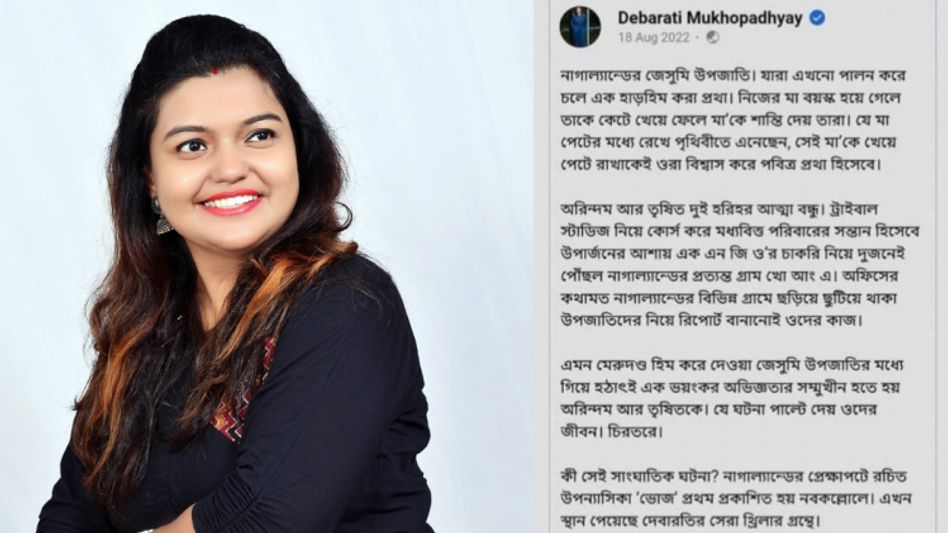The myth of a Bangla novel: A Naga ritual of sons killing and eating ageing mother
A Bangla novel brings to you a spine-chilling tradition of the Jeshumi tribe in the Phek district of Nagaland. When the mother gets old, the son kills and eats her to give her peace. There is a twist in the tale though. No such tribe exists in Nagaland.
 Spine-chilling tradition of the Jeshumi tribe in Nagaland
Spine-chilling tradition of the Jeshumi tribe in NagalandA tribe called Jeshumi in the Phek district of Nagaland.
They still practice a bone-chilling tradition. When the mother gets old, the son kills and eats her to give her peace. The mother, who brings the son to earth through her belly, ends up in the same son’s belly and thus is considered pious in their tradition.
That’s what you discover if you read a Bangla thriller novel Bhoj written by Kolkata-based author Debarati Mukhopadhyay. Only that this piece of socio-anthropological information is the imagination of the author and has not an iota of truth in it. And that’s what has landed author Mukhopadhyay in the middle of controversy with people in Nagaland and in other states of the northeast reacting strongly to it.
A native of Nagaland named Imlibenla Wati wrote on social media: “This morning I felt sick in the stomach to read this post especially because it is depicting us, the Nagas to the entire world...such writings will malign the image of Nagas in the minds of mainland India…I have been closely associated to the people of Phek district and the fact mentioned by this writer is gruesome and should be condemned by all Nagas and recommended to the Ministry of Broadcasting to take necessary action against the writer for spreading rumours and hatred.”
Kolkata-based Indian Revenue Service officer Ashiq Zaman, who hails from Assam, says: “Firstly there is no tribe called jeshumi in Nagaland. And there is no man-eating tribe. This will only create hate and panic in the minds of the people of other parts of India and the world about the people of the northeast. What’s the need to write such a humiliating novel about the people of northeast?” He also urged the Nagaland government and the Ministry of Development of the North Eastern Region to intervene in this matter.
The author, however, dismisses these criticisms by saying that it is an imaginary story based on an imaginary community and so there is no question of hurting the sentiments of any community or defaming Nagaland. “Authors often write stories based on a state or a region. Suppose I write that a person in Kolkata murdered someone. Does that mean I am defaming Kolkata?” Mukhopadhyay told India Today NE.
The author also claims that she has visited the northeast multiple times and is an avid admirer of its culture but is shocked to see how they are misunderstanding her imaginary story. “People these days don’t read the content. They start questioning after reading a few lines. If this happens, authors can’t write anything,” she says.
The novel was first published as a series in the magazine Nabakallol in 2017. Bhoj is about two youths, Arindam and Trisith, who are into tribal studies, and joins an NGO. As a part of their job, they visit Khong Ang village of Nagaland and get to know about the spine-chilling tradition of the jeshumi tribe that changes their lives forever.
Copyright©2025 Living Media India Limited. For reprint rights: Syndications Today









